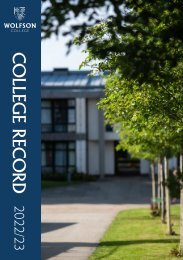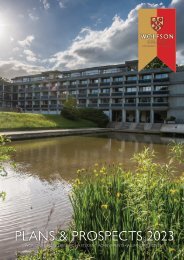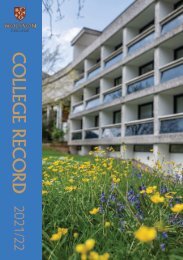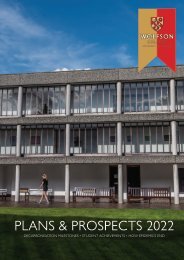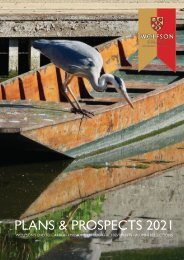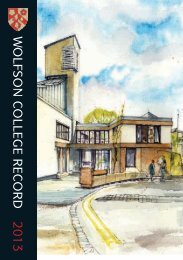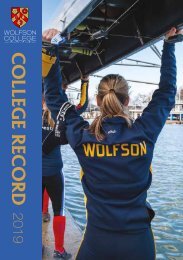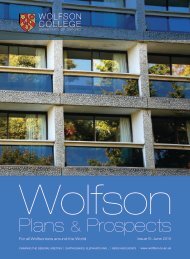You also want an ePaper? Increase the reach of your titles
YUMPU automatically turns print PDFs into web optimized ePapers that Google loves.
atmosphere of Wolfson, and the fact, as Maita later put it, that all the tables in Hall<br />
were at the same height and spouses were not transparent. The architecture of the<br />
place was also very congenial to someone like Maita, trained in Brazilian modernity<br />
in the tradition of Oscar Niemeyer and others of his generation. A few years ago, we<br />
found ourselves staying with friends a short distance from Portofino in Italy and just<br />
a few yards from Isaiah Berlin’s summer house. It meant a lot to Maita to see the<br />
beautiful curved bay of Portofino, which inspired our first President to suggest to the<br />
architects Powell and Moya that they adopt a curved layout for our iconic B block<br />
leading to the bridge over the Cherwell – the ‘Berlin curve’.<br />
Nor did I initially understand what Wolfson meant within the wider University<br />
system.<br />
I was aware early on that Iffley <strong>College</strong> was founded in 1965 as part of a solution<br />
to the University problem of entitlement. It was designed to absorb many of the<br />
academics who, for one reason or another, had no college attachment. Once a<br />
building on Banbury Road was secured, the intake of graduate students started in<br />
1968, by which time the college was renamed Wolfson. It is easy to forget now just<br />
how radical the creation of graduate colleges was in the 1960s. This was brought<br />
home to me by reading Michael Brock’s 2003 account of the early days of the<br />
<strong>College</strong> reproduced in the delightful book about its first fifty years, compiled and<br />
edited by John Penney and Roger Tomlin. Michael Brock characterises Oxford’s<br />
attitude towards the development of graduate colleges as ‘a mixture of disdain and<br />
alarm’. Disdain because the prevailing view, particularly in the humanities and social<br />
sciences, was that teaching undergraduates is what really matters in a university.<br />
Alarm because graduate colleges would make possible the implementation of a<br />
rather unpopular recommendation in the 1966 Franks Report, namely that students<br />
going on to graduate studies be released by their undergraduate colleges to seek<br />
more graduate-friendly institutions. Brock himself admits that when he came to<br />
Wolfson after 16 years of a tutorial fellowship in Oxford, he was slow to grasp the<br />
awkward truth, espoused by Isaiah Berlin, that ‘for good or ill a place among the<br />
world’s leading universities no longer depended, to any great degree, on excellence<br />
in undergraduate teaching.’<br />
That was then and this is now.<br />
117



